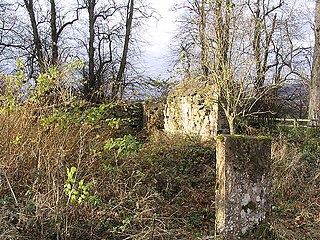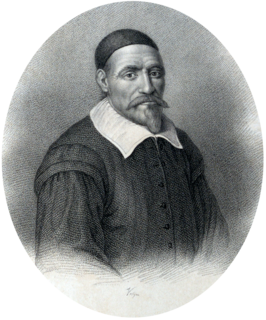Robert Baillie was a Church of Scotland minister who became famous as an author and a propagandist for the Covenanters.

John Row was a Scottish ecclesiastical historian and one of the Scottish Reformers. As minister of Carnock in Fife, he was a leading opponent of Episcopacy. Row's Historie of the Kirk of Scotland (1558–1637), left by him in manuscript, is an original authority for the period. An account of his life is attached to the work.

Rev Prof Samuel Rutherford was a Scottish Presbyterian pastor, theologian and author, and one of the Scottish Commissioners to the Westminster Assembly.

David Calderwood was a Church of Scotland minister and historian. Calderwood was banished for his nonconformity, he found a home in the Low Countries, where he wrote his great work, the Altare Damasccnum. It was a serious attack on Anglican Episcopacy. Patiently and perseveringly Calderwood goes over the whole. The Bible, the Fathers, and the Canonists, are all referenced. Calderwood lived to see the principles for which he had suffered, and which he had defended, in complete ascendency. He was present at the Glasgow Assembly in 1638, and saw Prelacy and the Ceremonies swept away. He breathed his last at Jedburgh, a fugitive from his parish of Pencaitland; and they laid him in the churchyard of Crailing, where the first years of his ministry were spent.

Archibald Johnston, Lord Wariston was a Scottish judge and statesman.

Robert Blair was a Scottish presbyterian minister who was excommunicated in 1634 but became a Westminster Divine and was Moderator of the General Assembly of the Church of Scotland in 1646 after an unsuccessful attempt to emigrate to Boston in 1636.
Robert Douglas (1594–1674) was the only minister of the Church of Scotland to be Moderator of the General Assembly five times.

David Dickson or Dick was a Church of Scotland minister and theologian.
James Hamilton was a Scottish minister of presbyterian views, active in Ireland until deposed from his living.
Andrew Gray (1633–1656), was a Scottish divine. Gray was baptised on 23 August 1633. He was the son of Sir William Gray of Pittendrum, and Egidia Smith. He graduated from St Andrews University with an M.A. in 1651. He was licensed as a minister in 1653 and called on 5 September. He was ordained by the Protesters on 3 November 1653 but his ministry was a short one. He died on 8 February 1656.
John Nevay was a Scottish Covenanter. He was the nephew of Andrew Cant, minister of Aberdeen. He graduated with an M.A. from King's College, Aberdeen, in 1626. He worked as tutor to George, Master of Ramsay. He was licensed by the Presbytery of Dalkeith 14 October 1630 on the recommendation of that of Alford, but left its bounds a fortnight after. He was admitted about 1637 and appointed in 1647 a member of committee to revise the Psalter. He was present at Mauchline Moor in opposition to the royal army in June 1648. He was subsequently pardoned by Parliament on 16 January 1649. Nevay was appointed a commissioner by Parliament for visiting the University of Aberdeen 31 July 1649. He was active in raising the western army in 1650, and in 1651 a prominent supporter of the Protesters. In 1654 he was named by the Council of England on a committee for authorising admissions to the ministry in the province of Glasgow and Ayr. On 23 December 1662 he was banished by the Privy Council from His Majesty's dominions and went to Holland, where he died in 1672, aged about 66.

John Livingstone or Livingston was born in Kilsyth, on 21 June 1603. He was the son of William Livingstone, minister of Kilsyth, and afterwards of Lanark, said to be a descendant of the fifth Lord Livingston. His mother was Agnes, daughter of Alexander Livingston, portioner, Falkirk, brother of the Laird of Belstane.
George Winram, Lord Liberton MP (1604–1650) was a 17th-century Scottish judge, politician, soldier and Senator of the College of Justice.

Robert MacWard, a covenanting minister, appears to have studied at the University of St. Andrews, where he was for some time regent of humanity. In 1654 he was appointed one of the regents of Glasgow University without competition on 4 August 1653, but resigned the appointment from ill-health, and on 8 September was ordained to the collegiate charge of the Outer High Church, Glasgow, the usual ordination trials being dispensed with. From 1656 to 1659 he had charge of the south district of the parish, in 1660 of the west, and in 1661 of the east. In 1659 he was named for the vice-chancellorship of the university, but the proposal, which was opposed by Robert Baillie, who seems always to have borne him a grudge, was unsuccessful.
Josias Welsh was one of the early Scots ministers who settled in Ulster in the 17th century. He was deposed for his adherence to Presbyterian principles. He was related to many other famous Presbyterian preachers being the grandson of John Knox, the son of John Welsh of Ayr, and the father of John Welsh of Irongray.
James Durham, born 1622, was the eldest son of John Durham of Easter Powrie, north of Dundee. He was educated at University of St Andrews, and betook himself to the life of a country gentleman. While visiting his mother-in-law in the parish of Abercorn, he came under profound religious impressions in consequence of a sermon by Melvill, minister of Queensferry. Joining in the Civil War, he was promoted captain, and seriously exhorted and led the devotions of his company; this being noticed by Professor Dickson, he was induced to prepare himself for the ministry, a resolution which was hastened by two narrow escapes on the battlefield. He graduated M.A.. He was licensed for the ministry by the Presbytery of Irvine 18 May 1647. He was admitted to the congregation of Blackfriars 2 December 1647. Durham was appointed chaplain to the King July 1650. He called 4 September 1651, with charge of West Quarter of the city. He endeavoured, without success, to effect a union between the two contending parties in the Church in 1652. He died of consumption, 25 June 1658.
James Wood was a Covenanter and Church of Scotland minister. He was appointed to be Professor of Divinity and Principal of the Old College, St. Andrews by Cromwell's government. He was deposed after the Restoration under the influence of Archbishop Sharp in 1663. He was then holding Presbyterian principles at a time when Charles II was promoting Prelacy. He died in 1664.
Robert Cunningham was one of the early Scots ministers who settled in Ulster in the 17th century. He was the first Presbyterian minister in Holywood and was one of Samuel Rutherford's correspondents. He was deposed for his adherence to Presbyterian principles.

John Semple was a seventeenth century minister in Ulster and Scotland. He began to preach after exhorting the people while leading the psalm-singing. His Presbyterian principles brought him into opposition to the policies of the civil authorities. He refused The Black Oath and was pursued by those sent from Dublin to apprehend non swearers. He relocated to Scotland and was named multiple times and threatened with severe punishment throughout his life including shortly before his death in his 75th year.

Alexander Petrie was a Scottish divine, born about 1594, was third son of Alexander Petrie, merchant and burgess of Montrose. He was the minister of Rhynd in Perthshire and was translated, to Rotterdam on 29 March 1643. He preached his first sermon at Rotterdam on 2 August, and was admitted on 30 August 1643. He died on 6 September 1662. His Compendious History of the Catholick Church contains copious extracts from the Records of the General Assembly of the Church of Scotland, which were destroyed by a fire in the Lawnmarket, Edinburgh, 1701.











